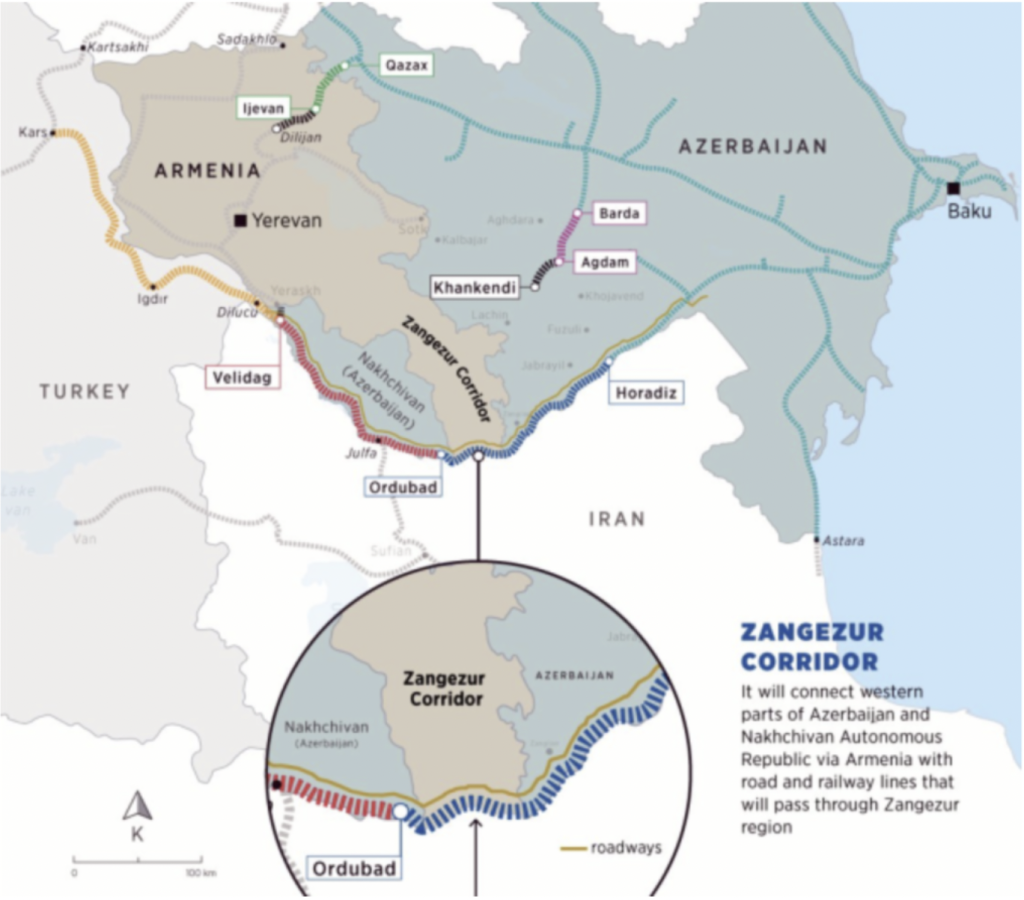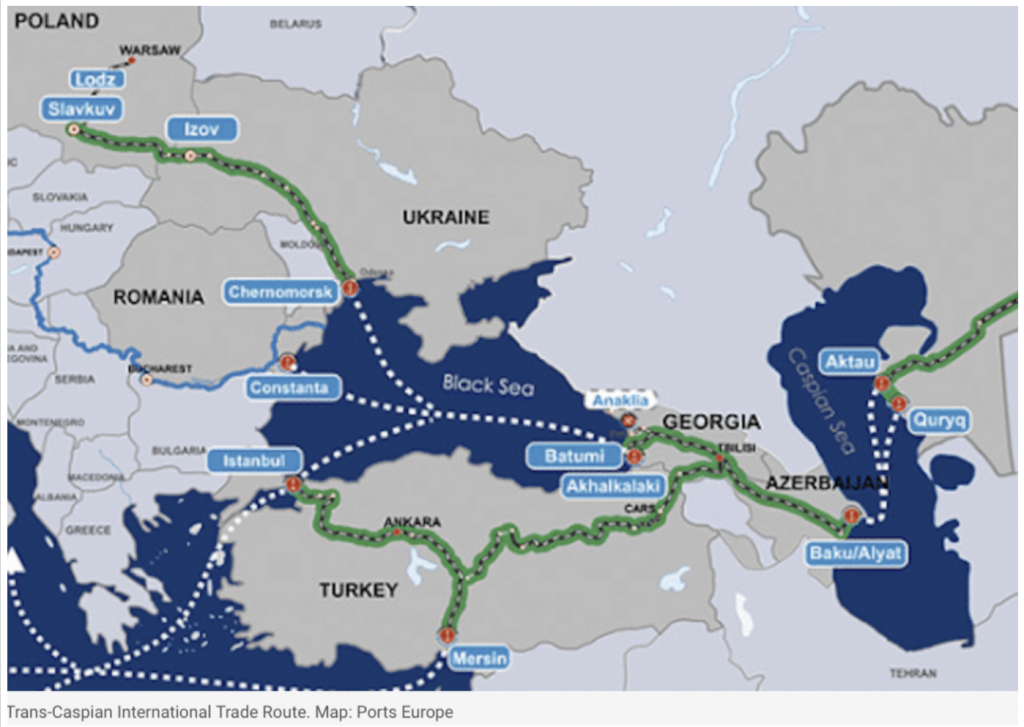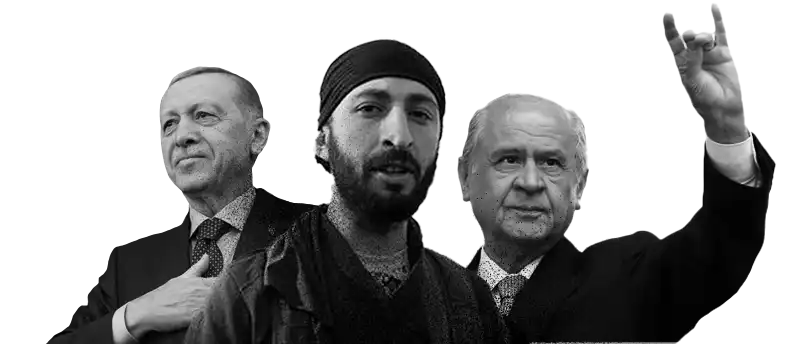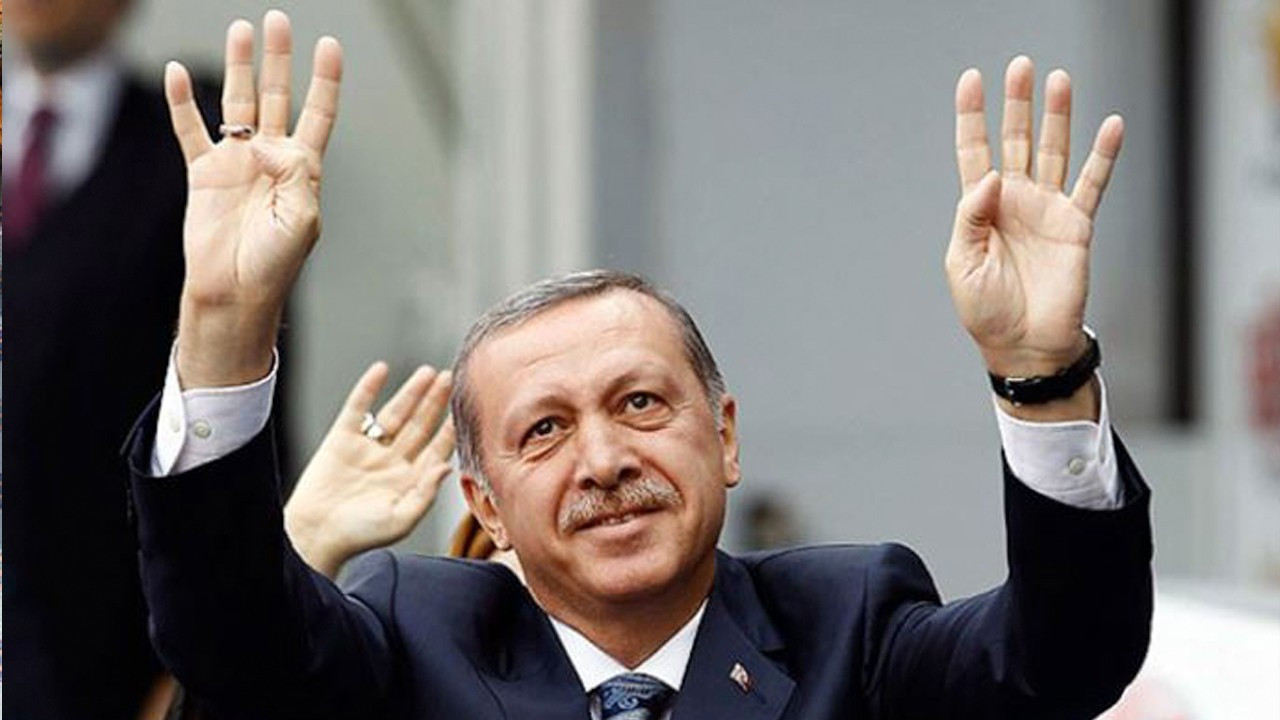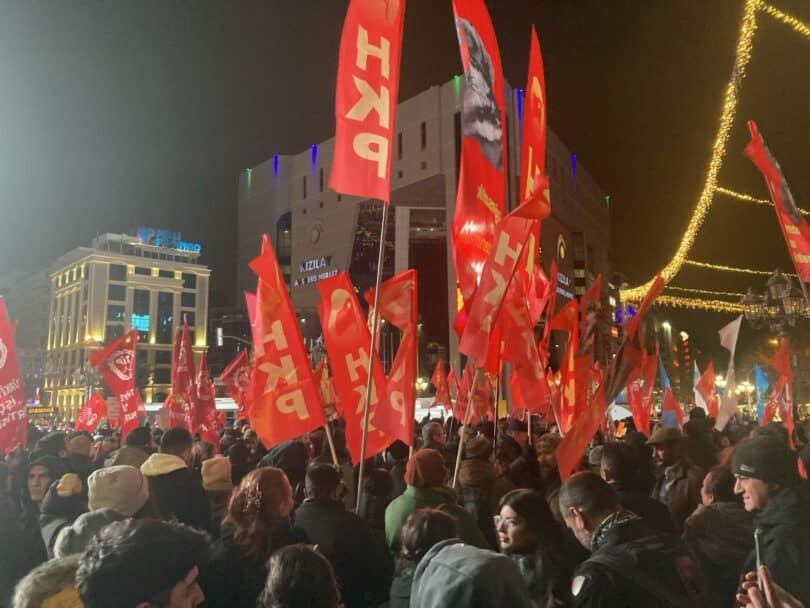Posted on July 15, 2024 by Conor Gallagher
In back-to-back weeks Turkish President Recep Tayyip Erdoğan attended first the Shanghai Cooperation Organization gathering in Astana and then the NATO summit in Washington DC. The contrast was stark.
Erdoğa made clear Türkiye’s opposition to escalation with Russia and US support for Israel, while Washington tried its usual small-carrot-big-stick approach. Far more interesting was what was happening with Türkiye, Russia, and China at the Shanghai Cooperation Organization gathering the week before the NATO summit.
But first, the problems with the world’s “most successful military alliance.” Türkiye is opposed to further escalation of Washington’s conflict with Russia. Public opinion at home is overwhelmingly against Israel and the US (during the NATO summit Erdogan said the US is “complicit” in Israeli war crimes). The US continues to support Türkiye’s Kurdish enemies in Syria while there are increasing problems with Syrian refugees in Türkiye. NATO generally seems hellbent on starting even more conflicts, such as with China which is in no one’s interest, but only Türkiye, Hungary, and Slovakia are apparently willing to say so.
Meanwhile, Ankara is facing fresh sanctions threats from the US where the House of Representatives is pushing forward with legislation that would require the Biden administration to sanction Russian nuclear energy company Rosatom and “its affiliates and subsidiaries…[and] authorize secondary sanctions on any foreign person engaged in significant transactions with Rosatom.”
This would have major implications for Türkiye’s first and only nuclear power plant, which was inaugurated last year with the delivery of the first nuclear fuel to the plant site – a major occasion in Türkiye as it marked the country joining the ranks of nuclear power nations. Rosatom financed and is building the plant that would provide roughly 10 percent of Türkiye’s energy needs once completed, but has recently faced delays due to difficulties obtaining equipment from third countries because of US sanctions. [1]
At the same time that the US is trying to muscle out Rosatom 14 years after it signed a deal with Ankara and after nine years of work on the project, it is is trying to pressure Türkiye into deals with American companies to build reactors in the country despite a whole host of issues with US designs, safety, cost, and the overarching geopolitical strategy since they would likely still rely on Russia (or possibly China) for key parts of the nuclear fuel supply chain.
Despite the threat of sanctions, Türkiye remains in talks with Russia for a second nuclear power plant, as well as with China’s for a third plant.
That is representative of the overall trend of Türkiye’s relations with the US on one side and Russia and China on the other. Slowly but surely Türkiye is being drawn further East, and while US sanctions might erect some speed bumps, they are not stopping the process. Barring a government coming to power in Ankara that takes its orders from Washington, which at this point would require a coup given the Turkish public’s increasing opposition to the US and the EU. Despite the rising resentment of the West in Turkiye, the sanctions weapon is unlikely to be sheathed, and there will be even more calls from US lawmakers for more pressure to force Ankara to “abide by international law,” [2]
Türkiye and the Shanghai Cooperation Organization
While the NATO nobility spent last week talking about starting wars they can’t win and controlling events they can’t control, Erdoğan enjoyed a warm reception at the Shanghai Cooperation Organization (SCO) summit in Astana two weeks ago. He met with both Russian President Vladimir Putin and Chinese President Xi Jinping, and both pledged to continue strengthening ties with Türkiye.
Founded in Shanghai in 2001, the SCO has always emphasized the importance of combating terrorism and radicalism, especially in Central Asia. The recent summit, however, was seen as an expansion of the SCO’s ambitions to become the security provider to the Eurasian continent. Belarus joined the SCO at the summit, which also counts Russia, Kazakhstan, Kyrgyzstan, China, Tajikistan, Uzbekistan, India, Pakistan, and Iran as members. Afghanistan and Mongolia are observer states, and there are 14 dialogue partners.
This is an organization that now represents roughly 42 percent of the world population and 80 percent of the Eurasian landmass. Most importantly, these countries constitute about one-third of world GDP and roughly $6 trillion more than the EU.
One only needs to look at a map to see how this bloc is becoming the center of the world in more than ways than one with Europe left out on the periphery – a decision of its own making.
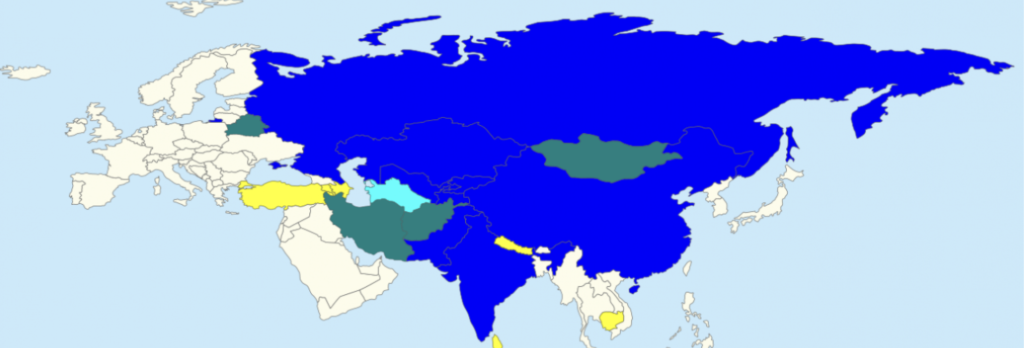
What the SCO wants to guard against above all else is efforts by the West to use terrorism or any other division strategies to thwart the growing power of its member states. The US has tried to use central Asian nations in this way in recent years to no avail as investment by China and Russia in these countries absolutely dwarfs what the West has on offer.
The importance of security in Eurasia helps explain Türkiye’s attractiveness to the SCO and BRICS, which is increasingly the economic partner organization to the former. It’s not just that Türkiye is the world’s 18th most populous country with a GDP per capita at purchasing power parity that places it 47th. It’s not just that it has a customs union agreement with the EU that currently makes it an attractive point to get around tariffs or sanctions.
It’s also that Türkiye would be a key piece to security architecture of the SCO. Here’s Erdoğan stressing this point following a meeting with Xi:
“The organization has become one of our important dialogue channels with Asia owing to our dialogue partner status, which we’ve held since 2013,” he said. “Our many years of experience fighting terrorism show that international cooperation is essential to dealing with this threat. In this context, we are ready to further strengthen our dialogue with the Shanghai Cooperation Organization.”
Erdoğan, once an outspoken critic of Beijing due to its alleged treatment of Uyghurs, a Muslim minority of Turkic origin in western China, has almost completely dropped his criticism in recent years.
Turkish Foreign Minister Hakan Fidan was in China in June talking up the possibility of Türkiye joining BRICS, but most importantly, he made some major statements regarding Xinjiang. According to a Chinese statement, Fidan told Chinese Vice President Han Zheng that Türkiye adhered to the one-China principle and “will not allow activities in Türkiye that undermine China’s territorial integrity”. China attaches immense significance to the issue and would likely be the number one topic in any discussions with Türkiye about further integration with BRICS or the SCO.
That cements a major shift for Türkiye, which used to call Xinjiang “East Turkistan,” accuse China of “genocide” against Uyghurs (a claim the rest of the West still makes), and allegedly play a role in training Xinjiang militants. The change in Türkiye’s stance likely causes consternation in Washington, but is a clear sign of the shift underway for a country that is no stranger to supporting jihadists to further its and Washington’s goals in West Asia.
Inching Closer to Türkiye-Syria Reconciliation (and a Major Blow to US Occupation of Syria)?
One of the biggest items on the SCO agenda involving Türkiye is resolving the Syria issue and getting the Americans out – a goal for which Türkiye would need to play a central role.
We can see those pieces starting to come together with Syria now.
On his trip back from the NATO summit, Erdoğan announced that Türkiye and Syria will determine a roadmap to revive long-frozen relations between the two neighbors and will take steps accordingly. FM Fidan is being tasked with restoring ties and setting up a meeting between Erdoğan and Assad.
Erdoğan showed renewed motivation to mend fences with Damascus following his meetings in Astana. Whatever he saw or didn’t see in Washington apparently provided even more motivation to restore ties with Syria – a relationship that was destroyed by Türkiye, in cahoots with the West, playing a major destabilizing role by funneling fighters to Syria and funding them. There has been noise about a Ankara-Damascus reconciliation for some time, but due to the steady encouragement from Moscow, it would appear to be getting closer. There would be benefits for both Türkiye and Syria of burying the hatchette, but the biggest impact viewed through a wider lens would be to make the US position in Syria more untenable.
And going forward, a Türkiye that is a member of the SCO and more in lockstep with Moscow and Beijing, would further the SCO mission to keep destabilizing forces at bay in Eurasia.
What other factors are pushing Türkiye towards the East?
Western Hubris
The EU may look back at some point in a decade or two and rue the decision to snub Türkiye, but Türkiye has long been expected to go along with the wishes of NATO and the EU despite often being treated like a second-class citizen. The failure of Türkiye’s EU accession is just one of many examples.
As mentioned above, the US threatening to torpedo the nuclear power plant in Türkiye is representative of another. The US sanctions Turkish individuals and companies for “aiding Russia,” for “aiding Iran,” and the US is already threatening to slap on more sanctions over Turkish firms’ exports to Russia. A quick search on the US Treasury’s Office of Foreign Assets Control site turns up a whopping 232 sanctioned Turkish individuals or entities. This is not a great look when Türkiye is going through its worst economic crisis in two decades.
There have also been, from the Turkish point of view, a lack of consideration of Turkish defense needs. In the 1990s, Ankara asked NATO multiple times to deploy early warning systems and Patriot missiles to Türkiye, but it never came to pass. In 2017 Russia sold Türkiye its S-400 missile defense systems, which are arguably superior to anything the West has. In response the US expelled Türkiye from its F-35 program and sanctioned the country’s defense industry organization and its leaders.
While the US keeps slapping more sanctions on Turkish entities, the economic relationship between Türkiye and SCO countries is growing exponentially.
The Economy – Sanctions or Investment?
Ahead of the SCO summit, the Turkish broadcaster TRT World highlighted the fact that Turkish exports to SCO countries increased by 85% in last 5 years:
Turkish exports to Shanghai Cooperation Organisation (SCO) member countries have skyrocketed 85 percent over the last five years from a value of $14.1 billion in 2019 to nearly $26.1 billion in 2023. The share of these countries in Türkiye’s overall exports last year was 10 percent.
Türkiye’s imports from SCO member countries also reached $106.3 billion last year, around double the $55.6 billion total in 2019.
Still, the EU is by far Türkiye’s top trading partner, accounting for almost one third of its trade while Türkiye is the EU’s seventh trading partner, making for 3.6 percent of total EU trade.
But Türkiye’s weak economy has the government seeking foreign investment. Enter China with its vast financial resources, which looks ready to provide an influx of capital for the price of cooperation on China and SCO goals.
Both Erdoğan at the SCO summit and FM Fidan in his recent trip to China were asking for more investment from Beijing in Türkiye. It looks like that is already coming through. Chinese automotive company BYD just announced that it will construct a $1 billion plant in western Türkiye. From the South China Morning Post:
The new factory would improve BYD’s access to the European Union, because Türkiye has a customs-union agreement with the bloc. The EU moved ahead this week with plans to impose provisional tariffs on electric vehicles imported from China, hitting BYD with an additional 17.4 per cent charge on top of the existing 10 per cent rate.
There’s also a domestic market to serve, with EVs accounting for 7.5 per cent of car sales last year in Türkiye, a country with a population of almost 90 million.
Türkiye announced Friday that it was walking back plans announced almost a month ago to impose an additional 40 per cent tariff on all vehicles from China, citing efforts to encourage investment. That decision followed talks between Erdoğan and China’s President Xi Jinping on Thursday during a meeting of the Shanghai Cooperation Organisation in Astana, Kazakhstan.
There is a belief that this BYD plant will open the floodgates to more Chinese investment turning Türkiye into a “production hub” with a heavy focus at least for now on tariff-free exports to European countries thanks to Ankara’s customs union agreement with Brussels.
As the economic balance of power cements its shift to Asia while Europe suffers through a partially self-inflicted decline, then Türkiye’s long-term importance is less clear. How valuable is Türkiye’s customs agreement with the EU going to be in 10 years?
But Türkiye could still be an important market on its own and security policy could be more important than a backdoor into the declining EU market. Russia, for example, would like to ensure going forward that Türkiye will not open the Turkish Straits to NATO warships thereby allowing them access to the Black Sea, and neither Beijing or Moscow want to see Ankara helping to destabilize central Asia.
Notably, China is also considering defense production cooperation with Türkiye, which would be a major step. Even as China’s foreign direct investment (FDI) rises in Türkiye, it still has a ways to go to match Europe. In 2022 Chinese FDI in Türkiye stood at $1.7 billion, but the EU-27 countries still contribute 59 percent of Türkiye’s FDI inflows. As for Russia, it supplies Türkiye with nearly half of its natural gas and a quarter of its oil. The two nations also cooperate on nuclear energy with Russia financing and building the aforementioned Akkuyu Nuclear Power Plant, and in talks to construct another.
Public Opinion
Türkiye’s pursuit of BRICS membership would mark a fundamental shift in the country, which has been positioning itself to become part of “the West” for decades, but in many ways the public in Türkiye has already turned its back on the EU and the US and looks more favorably to the East:
A poll conducted in December 2022 by the Turkish company Gezici found that 72.8% of Turkish citizens polled were in favor of good relations with Russia. By comparison, nearly 90% perceive the United States as a hostile country. It also revealed that 24.2% of citizens believe that Russia is hostile, while 62.6% believe that Russia is a friendly country. Similarly, more than 60% of respondents said that Russia contributes positively to the Turkish economy.
More recent polling for NATO’s 75-year anniversary by Pew Research Center don’t show such a dire picture, but Turks still have the second lowest approval rating of the alliance among members:
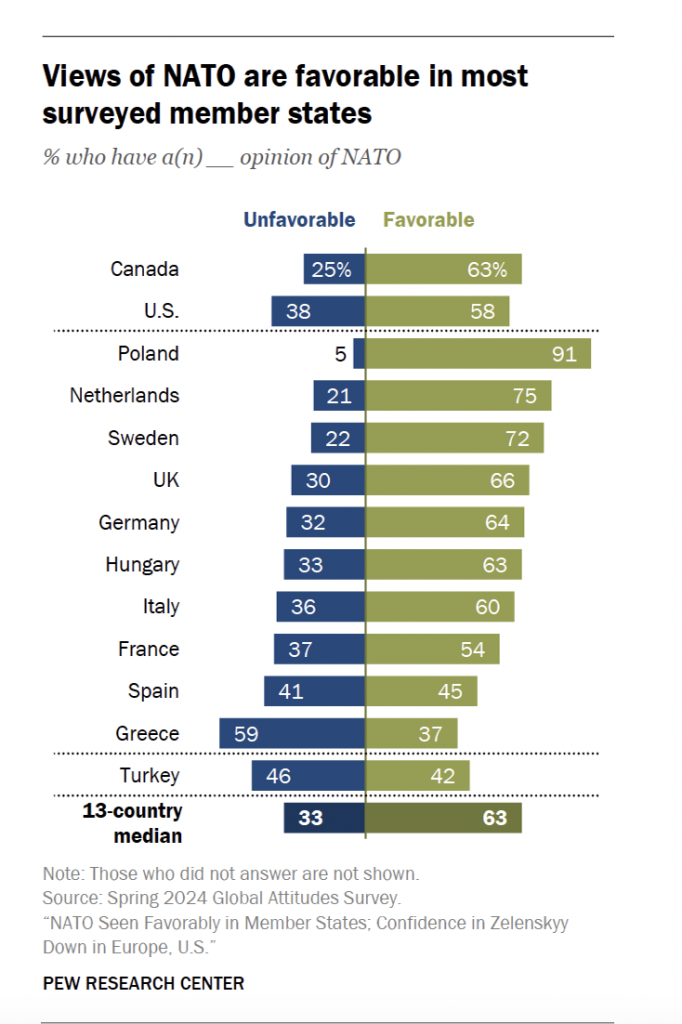
For Now, The Middle
Erdoğan talked about being part of both East and West in an interview with Newsweek. He’s effectively distancing himself from the lunatics at NATO while declaring neutrality in its conflicts. That’s playing to Türkiye’s advantage right now, but might not be all that valuable to be the bridge between Europe and Asia due to Europe’s long term economic prospects. It also becomes dangerous. There’s no way that NATO, for example, would tolerate Türkiye being a member in the SCO, and it will likely continue to try to wield stick measures in response to Ankara’s increasing cooperation with Moscow and Beijing. Türkiye has no reason to choose a side, as the commentary often goes, but it would not be uncharacteristic of the West’s with-us-or-against-us policies to try to force it to do so. That’s where the risk exists of being pulled apart by trying to straddle both sides as there is still a sizable bloc in the country that favors an exclusively western-oreiented policy.
It’s interesting to note that new legislation in Türkiye is attempting to crack down on “foreign interests.” According to Turkish Minute, that would apply to “anyone who carries out or orders research on (Turkish) citizens and institutions with the aim of acting against the security or the political, internal or external interests of the state, on the orders or in the strategic interests of a foreign organization or state.” Those convicted would face three to seven years in prison. These types of laws are increasingly being considered by states that say they fear Western meddling in their country, oftentimes with the aim of instigating color revolutions.
Should NATO and Turkiye suffer some sort of break, it will likely be the result of NATO’s flight from reality – not Turkiye. If the past is any guide, Türkiye has good odds to successfully navigate the transition to a more multipolar world with the Eurasian core at its center.
I’ve made the comparison before, but I think it bears repeating: In 1941, Türkiye and Germany signed a nonaggression pact, and Ankara raked in economic and military aid from both Axis and Allies trying to woo Türkiye to their side. As the tide changed in WWII, however, Türkiye wisely bet on the eventual victors, moving increasingly to the Allied side. In 1944 Türkiye stopped exporting chromite to Germany, a key ingredient in the manufacture of stainless steel, and later that year severed diplomatic relations with Germany. In 1945 Türkiye declared war on Germany – two months before its defeat.
Notes
[1] Ankara had been trying to get a nuclear power plant built for 50 years before signing a deal with Russia in 2010 to build the Akkuyu plant. Back in the 1990s Ankara had bids from Westinghouse + Mitsubishi, AECL, and Framatome + Siemens but had to cancel because it was going to cost more than the Turkish government could afford at the time.
Türkiye eventually pivoted to Russia’s build-own-operate model because it was an arrangement Ankara could afford. Under this arrangement, Russia financed, built, and is delivering the fuel to Akkuyu. Russia will also handle the waste. For the moment Rosatom owns 75 percent of the shares in the plant, although it reserves the right to sell a project share of not more than 49% to other investors’, thus keeping the controlling interest of 51 percent.
Türkiye will buy a fixed proportion of the power at a fixed price of 12.35 ¢/kWh for 15 years. The proportion will be 70 percent of the output of the first two units and 30 percent of that from units 3 and 4 over 15 years. The remainder of the power will be sold by the project company on the open market. After 15 years, when the plant is expected to be paid off, the project company will pay 20 percent of the profits to the Turkish government.
Turkish nuclear engineers are also receiving training from the Russians. As the Bulletin of the Atomic Scientists says: “Given the costs for the construction, operation, and maintenance of the plant, as well as for the management and transport of the waste, this was considered ‘an economically well-negotiated agreement’ by nuclear energy policy experts. In short, it was a good deal for Türkiye.”
[2] There were also the usual calls to “re-engage” with Türkiye like the following piece from the Atlantic Council arguing that the US should open a “dialogue” and involve Türkiye in Black Sea plans.” That’s probably a problem if the argument needs to be made to involve the country that controls access to the Black Sea and is part of the world’s “most successful military alliance.”
https://www.nakedcapitalism.com/2024/07 ... ijing.html

